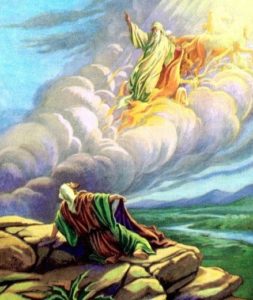This week’s parasha, Pinchas, begins by praising Pinchas, grandson of Aaron, for slaying the wicked Zimri and Cozbi, and describes God’s eternal reward to him. In the past, we have already explored in depth how Pinchas became Eliyahu. In addition to this, Kabbalistic texts note that smaller soul-sparks of Pinchas went to several other people in history. One of these people is the Talmudic sage Pinchas ben Yair, who is featured even more prominently in the Zohar. The Talmud seems to state that Pinchas ben Yair was the son-in-law of Rabbi Shimon bar Yochai, while the Zohar makes clear that he was his father-in-law. The contradiction has puzzled many in the past. How do we make sense of this, and what does the Biblical Pinchas have to do with it all? Continue reading
Tag Archives: Rabbi Menachem Azariah de Fano
Pinchas is Eliyahu—and So Much More

‘Elijah Taken Up to Heaven’
The Midrash famously comments on the eponymous subject of this week’s parasha that “Pinchas is Eliyahu” (Yalkut Shimoni I, 771). This statement is echoed throughout rabbinic texts and, with minor exceptions, all agree that Pinchas and Eliyahu were one and the same person. There are many reasons for this. With Pinchas, we read that God gave him a blessing of peace and “eternal priesthood”, suggesting that Pinchas would forever be a kohen. We go on to read how Pinchas was the kohen gadol for centuries, throughout the period of Judges, and the Tanakh never records his death. Meanwhile, Eliyahu appears in the Tanakh quite suddenly without any background information, genealogy, or patronymic. He goes on to avoid death and be taken up to Heaven in a fiery chariot.
Most tellingly, we find a unique Scriptural statement used in relation to these two figures, and no one else. Pinchas is described as having stood up zealously for God (בקנאו את קנאתי, Numbers 25:11), and Eliyahu uses the same words when speaking to God, saying he was zealous for God (קנא קנאתי, I Kings 19:10). The Sages conclude that they must be one and the same zealot! If that’s the case, why and how did Pinchas become Eliyahu? Continue reading
Two Reincarnations You Need to Know About
This week’s parasha, Yitro, begins: “So Moses’ father-in-law, Jethro, took Tzipporah, Moses’ wife, after she had been sent away, and her two sons… to the desert where [Moses] was encamped, to the mountain of God.” (Exodus 18:2-5) After the Israelites safely made it to Mt. Sinai following the Exodus, Moses’ family returned to join him. However, we had previously read that when Moses first left Midian for Egypt before the Exodus, he had taken his family with him! (Exodus 4:20) Where did they go? Continue reading
